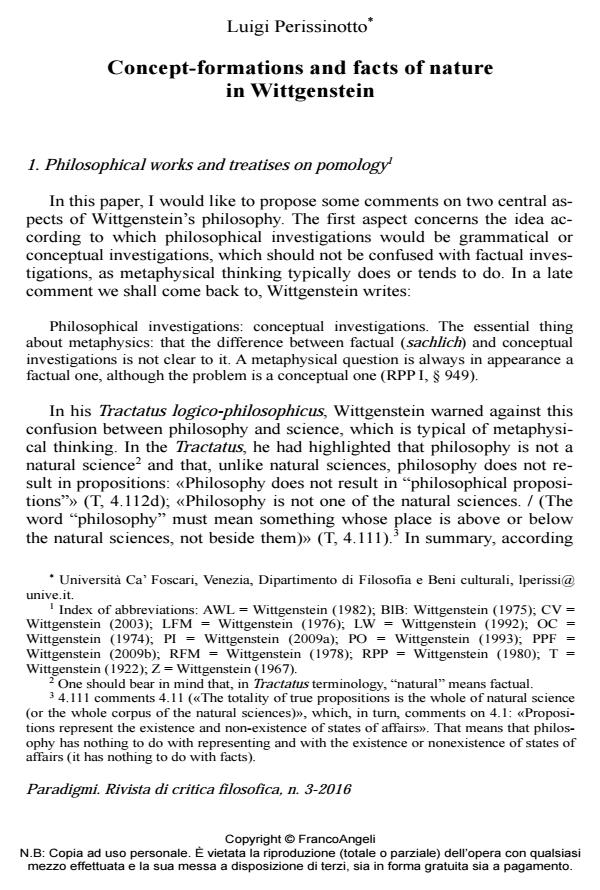Concept-formations and facts of nature in Wittgenstein
Titolo Rivista PARADIGMI
Autori/Curatori Luigi Perissinotto
Anno di pubblicazione 2017 Fascicolo 2016/3 Lingua Inglese
Numero pagine 21 P. 11-31 Dimensione file 216 KB
DOI 10.3280/PARA2016-003002
Il DOI è il codice a barre della proprietà intellettuale: per saperne di più
clicca qui
Qui sotto puoi vedere in anteprima la prima pagina di questo articolo.
Se questo articolo ti interessa, lo puoi acquistare (e scaricare in formato pdf) seguendo le facili indicazioni per acquistare il download credit. Acquista Download Credits per scaricare questo Articolo in formato PDF

FrancoAngeli è membro della Publishers International Linking Association, Inc (PILA)associazione indipendente e non profit per facilitare (attraverso i servizi tecnologici implementati da CrossRef.org) l’accesso degli studiosi ai contenuti digitali nelle pubblicazioni professionali e scientifiche
The present essay introduces and discusses two important aspects of Wittgenstein’s philosophy. The first one is his insistence on the fact that philosophical investigations are conceptual or grammatical investigations, not to be confused with factual investigations. It will be shown that it is exactly this kind of confusion between the conceptual and the factual, which characterizes, according to Wittgenstein, metaphysical thinking. The second aspect, narrowly connected to the first one, concerns the way in which Wittgenstein tries to show that conceptual or grammatical investigations must take into account the correspondence obtained between our grammar or our conceptual formations on one hand and many general facts of nature on the other, without therefore becoming or taking up the form of a natural science or natural history.
Questo saggio introduce e discute due aspetti importanti della filosofia di Wittgenstein. Il primo è la sua insistenza sul fatto che le indagini filosofiche sono indagini concettuali o grammaticali, che non devono essere confuse con le indagini fattuali. Si mostrerà che è esattamente questo tipo di confusione tra il concettuale e il fattuale che caratterizza, secondo Wittgenstein, il pensiero metafisico. Il secondo aspetto, connesso strettamente al primo, concerne il modo in cui Wittgenstein cerca di mostrare che le indagini concettuali o grammaticali devono tenere conto della corrispondenza tra le nostre formazioni grammaticali o concettuali, da un lato, e molti fatti generali della natura, dall’altro, senza diventare o assumere in questo modo la forma di una scienza o di una storia naturale.
Keywords:Concetti, Grammatica, Metafisica, Natura, Psicologia, Wittgenstein.
- Drury M. O’C. (1996). Conversations with Wittgenstein. In: Berman D., Fitzgerald M. and Hayes J., eds. The dangers of words and writings on Wittgenstein. Bristol: Thoemmes: 97-171.
- Frege G. (1884). Die Grundlagen der Arithmetik. Eine logisch-mathematische Untersuchung über den Begriff der Zahl. Breslavia: Köbner (English transl.: The foundations of arithmetic. A logico-mathematical enquiry into the concept of number. Evanston, ILL: Northwestern University Press, 1980).
- Kenny A. (1984). Wittgenstein on the nature of philosophy. In: Kenny A. The legacy of Wittgenstein. Oxford: Blackwell: 38-60.
- Köhler W. (1947). Gestalt Psychology. An introduction to new concepts in the modern psychology. New York: Liveright.
- Kuusela O. (2008). The struggle against dogmatism. Wittgenstein and the concept of philosophy. Cambridge, MA: Harvard University Press and London: Harvard University Press.
- Marion M. (1998). Wittgenstein, finitism, and the foundations of mathematics. Oxford: Clarendon Press.
- Wittgenstein L. (2009b). Philosophy of psychology. A fragment. In: Wittgenstein (2009a): 182-26.
- Wittgenstein L. (20094a). Philosophical investigations. Oxford: Wiley-Blackwell: 1-181.
- Wittgenstein L. (2003). Culture and value. A selection from the posthumous remains. Oxford: Blackwell.
- Wittgenstein L. (1993). Philosophical occasions 1912-1951. Indianapolis: Hackett.
- Wittgenstein L. (1992). Last writings on the philosophy of psychology. The inner and the outer 1949-1951, Vol. II. Oxford: Blackwell.
- Wittgenstein L. (1982). Wittgenstein’s lectures. Cambridge 1932-1935. Oxford: Blackwell.
- Wittgenstein L. (1980). Remarks on the philosophy of psychology, Vol. I and Vol. II. Oxford: Blackwell.
- Wittgenstein L. (19782). Remarks on the foundations of mathematics. Oxford: Blackwell.
- Wittgenstein L. (1976). Lectures on the foundations of mathematics. Cambridge, 1939. Hassocks (Sussex): The Harvester Press.
- Wittgenstein L. (1975), The blue book. In: The blue and the brown books. Oxford: Blackwell.
- Wittgenstein L. (19742). On certainty. Oxford: Blackwell.
- Wittgenstein L. (1967). Zettel. Oxford: Blackwell.
- Wittgenstein L. (1922). Tractatus logico-philosophicus. London and Henley: Routledge & Kegan Paul, 1974.
- Russell B. (1935-1936) The limits of empiricism. Proceedings of the Aristotelian Society, new series, 36: 131-150.
- Moyal-Sharrock D. (2013). Realism, but not empiricism: Wittgenstein versus Searle. In: Racine P.T., Stanley K.L., eds. A Wittgensteinian perspective on the use of conceptual analysis in psychology. Basingstoke: Palgrave Macmillan: 153-171.
- Wittgenstein and Pragmatism Anna Boncompagni, pp.181 (ISBN:978-1-137-58846-3)
- Wittgenstein and Pragmatism Anna Boncompagni, pp.221 (ISBN:978-1-137-58846-3)
Luigi Perissinotto, Concept-formations and facts of nature in Wittgenstein in "PARADIGMI" 3/2016, pp 11-31, DOI: 10.3280/PARA2016-003002